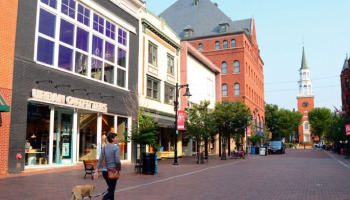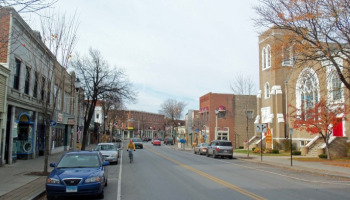Expert Insights
Lawmakers in Vermont recently proposed a bill that would make major changes to the way people are charged when arrested for drug possession. According to the text of the bill, penalties for possession of certain amounts of drugs would go from criminal offenses to civil offenses. The bill is a good example of how Vermont residents’ views on addiction are changing amidst the deadly opioid epidemic.
The groups Data for Progress and the Drug Policy Alliance recently conducted a survey of 547 likely voters in Vermont and asked them how the state should approach drug use, along with asking how they felt about the proposed legislation to change the way the state prosecutes drug possession. When the responses were compiled, the groups found that Vermont voters strongly support lowering or removing criminal penalties for drug possession. What’s more, they strongly support taking alternate approaches that would steer people towards treatment services.
~ Kerry Nenn
How Much Does Drug Rehab Cost in Vermont?
Vermont is ranked 35th nationwide in terms of addiction treatment affordability, with an average cost of drug and alcohol rehab of $57,667 (without insurance).
- Medical detox is the most expensive, with an average cost of $142,170
- Long-term inpatient drug rehab in Vermont costs an average of $50,888
- Outpatient addiction treatment in Vermont costs an average of $8,456
- Outpatient methadone treatment is the most affordable, with an average cost of $7,513
How to Pay for Drug Rehab in Vermont
As of 2024, there were over 50 drug rehab facilities across the state of Vermont. These facilities accept several payment methods. Of those treatment facilities, the following numbers reflect how many accept their respective payment methods:
Private Pay + Insurance
To help pay for treatment in Vermont, many facilities accept health insurance. Some also allow you to self pay. Each insurance plan is different in what specific type of rehab that it will cover. It is important to talk with your insurance provider to understand in and out of network benefits and coverage.
Some of the major private insurance carriers in Vermont include:
- United Healthcare
- Blue Cross Blue Shield of Vermont
- MVP Healthcare
Medicaid and Medicare
Medicaid covers a variety of addiction treatment options in Vermont. It can be used for addiction treatment services like detox and outpatient rehab. With Medicaid and Medicare, you might be responsible for a copay.
There might also be some limitations on what these insurance programs can cover regarding substance use treatment.
Military Insurance
If you are a veteran or have military insurance such as TRICARE, the cost of substance use treatment can be covered. TRICARE covers a variety of services such as inpatient care, medication assisted treatment, outpatient services, partial hospitalization programs and residential care. Vermont also has grant funding available for active duty military personnel to obtain substance use treatment.
Tribal Funding/Programs
The purpose of the Tribal Opioid Response Grant is to help address the rise in opioid use within tribal communities. This has helped with the lack of access to treatment and has increased access to culturally appropriate and evidence based treatment. There are no specific programs in Vermont related to additional tribal funding other than the national response grant.
Other Low-cost Options
Each rehab is different, and low cost options can vary between each one. Some programs may offer financial aid such as scholarships to help pay for treatment. Others may offer a sliding payment scale based on income. It is important to talk with your provider to see what options they offer when it comes to paying for or accessing treatment.
Free & Low-Cost Addiction Treatment in Vermont
As of 2024, there were over 50 drug rehab facilities across the state of Vermont. These facilities accept several payment methods. Of those treatment facilities, the following numbers reflect how many accept their respective payment methods:
Vermont has rehab facilities that use state or federally awarded grant money to help uninsured or individuals with a low socioeconomic status pay for substance use treatment. They also have additional services that help you get connected to the right recovery program. The statewide resource, Vermont Helplink, helps residents connect to substance use services for treatment and recovery support.
This helpline is confidential and conducted by trained specialists. It’s also free. Another important resource to consider is the Vermont Alliance for Recovery Residences which helps improve access to residents who need a safe place to live during recovery.
This service can also provide information about residential recovery options throughout the state of Vermont.
Free Addiction Treatment Resources in Vermont
- Spring Lake Ranch – Cuttingsville, VT:This is a residential facility for adults experiencing both substance use and mental health issues. One of the requirements is that you need to be sober for 30 days before being admitted. This program focuses on work therapy rather than traditional types of treatment. Some of the activities can include feeding and caring for farm animals, tending vegetable gardens, landscaping, building furniture and sewing.
- BAART Programs – Newport, VT: This program offers outpatient substance use treatment for adults who are recovering from opioid dependence. They have additional specialized services for pregnant and postpartum women, justice involved individuals, and people with dual diagnosis. This program offers medication assisted treatment, intensive trauma informed counseling and group and family therapies. They also promote sobriety through life skills training that focuses on topics such as self care, wellness, disease management, medication management and relapse prevention.
- Howard Center Chittenden Clinic – South Burlington, VT: This program provides outpatient opioid recovery services for adults. They offer medication assisted treatment in addition to individual, family and group therapies. They can also help you with other issues such as emotional regulation, medication management and relapse prevention. You will also be set up with aftercare to help you continue working through your sobriety and to address any additional needs.
- Health Care and Rehabilitation Services – Springfield, VT: This is a program that focuses on mental health and addiction recovery. They offer intensive outpatient programs, outpatient programs and aftercare services. They have a wide variety of treatment options available for young adults, seniors, pregnant and postpartum women and members of the LGBTQ+ community. You’ll also get the chance to engage in different treatment modalities such as cognitive behavioral therapy.
- Central Vermont Substance Abuse Services – Berlin, VT: This is an outpatient facility for adults and adolescents who are experiencing mental health and substance use issues. They specialize in addiction counseling, individualized care and recovery education. They also have gender specific treatment as well as programming for justice involved people. You’re also able to receive medical and mental health assessments. Same day and walk in appointments are available.
Drug Laws in Vermont
- Marijuana Laws in Vermont: Vermont became the first state to legalize marijuana. This happened in 2018. The law allows Vermont residents who are 20 years old or older to possess up to one ounce of marijuana. This also allows you to have up to two mature marijuana plants or four immature plants per household. If you’re under the age of 21 and found to be in possession of marijuana, you risk facing fines or can possibly lose your driver’s license.
- Good Samaritan Overdose Law: If you or someone you are with experiences an overdose, you can call 911 without being prosecuted for using or holding illicit drugs. This also protects you if you are in possession of drug paraphernalia. The drug contraband can be confiscated, but it will not be used as any type of evidence.
- Drug Testing Laws: In Vermont, employers can only give urine drug screens. The law prohibits blood testing. Employers have to use the labs approved by the Vermont Department of Health. As an employee you can request a blood test if you choose. There are no laws that prevent employers from drug testing potential applicants, even with the legalization of recreational marijuana use.
- Prescription Monitoring System: This was established in 2016 to help with the opioid crisis. This system is set up so doctors or other medical prescribers can share information about patients who receive opioid medication. This helps prevent patients from shopping around for multiple prescriptions or doctors who will prescribe opioids to them. This helps prevent the overuse of these medications.
Sources:
https://www.drugrehabs.com/vermont/
https://www.findlaw.com/state/vermont-law.html
https://www.uvm.edu/consumer/businesses/drug-testing
https://legislature.vermont.gov/statutes/section/21/005/00514









